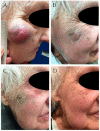Merkel Cell Carcinoma: New Trends
- PMID: 33807446
- PMCID: PMC8036880
- DOI: 10.3390/cancers13071614
Merkel Cell Carcinoma: New Trends
Abstract
Merkel cell carcinoma (MCC) is a rare neuroendocrine tumor of the skin mainly seen in the elderly. Its incidence is rising due to ageing of the population, increased sun exposure, and the use of immunosuppressive medication. Additionally, with the availability of specific immunohistochemical markers, MCC is easier to recognize. Typically, these tumors are rapidly progressive and behave aggressively, emphasizing the need for early detection and prompt diagnostic work-up and start of treatment. In this review, the tumor biology and immunology, current diagnostic and treatment modalities, as well as new and combined therapies for MCC, are discussed. MCC is a very immunogenic tumor which offers good prospects for immunotherapy. Given its rarity, the aggressiveness, and the frail patient population it concerns, MCC should be managed in close collaboration with an experienced multidisciplinary team.
Keywords: Merkel cell carcinoma; biomarkers; immunotherapy; radiotherapy; surgery.
Conflict of interest statement
All authors declare no conflict of interest.
Figures


References
-
- Brewer J.D., Shanafelt T.D., Otley C.C., Roenigk R.K., Cerhan J.R., Kay N.E., Weaver A.L., Call T.G. Chronic lymphocytic leukemia is associated with decreased survival of patients with malignant melanoma and Merkel cell carcinoma in a SEER population-based study. J Clin. Oncol. 2012;30:843–849. doi: 10.1200/JCO.2011.34.9605. - DOI - PubMed
Publication types
LinkOut - more resources
Full Text Sources
Other Literature Sources

